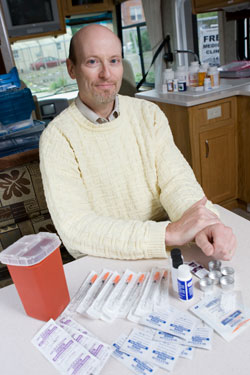Pioneering research by Burris
Sometimes careers in research begin as they do in the movies, with a flash of illumination. That’s what happened to Professor Scott Burris of Temple’s Beasley School of Law 28 years ago on a train from New York to Connecticut.
But Burris’s light bulb moment didn’t just launch a brilliant research career that would eventually make him the first law professor to win Temple’s Faculty Research Award — it jump-started a whole field of study: public health law.
In 1984, Burris was a student at Yale Law School looking for ways to combine his interests in legal analysis and public interest law. It was the beginning of the AIDS epidemic, and San Francisco health authorities had just shut down the city’s bath houses. A few weeks later, Burris boarded a commuter train, picked up a discarded newspaper and read an article about children who had been prevented from attending school because of another virus, Herpes. That’s when it hit him. Any day now, there would be kids with AIDS — and people wouldn’t want them in schools either. Burris realized that unjust actions would be taken against people with AIDS. But what were the laws? He retreated to the library and quickly realized that legal scholarship about public health law hadn’t been produced for half a century.
The pioneering research paper on AIDS, Herpes and public health law that Burris wrote in the coming months would be the first of many, and it combined law and science in a way that became Burris’s trademark.
“The answers to these problems aren’t really legal. They turn on scientific evidence,” Burris said. “To understand the cases, one has to understand not just the law, but also the social construction of disease. That experience in law school set me on a road to a more scientific approach to issues.”
Since then, Burris — who joined the Temple Law faculty in 1991 — has been a prime mover in the legal response to HIV/AIDS. His scholarship has helped define a wide range of legal issues in HIV control, from using criminal laws to control risky behavior to harm reduction measures for drug users and sex workers. His work on HIV also helped lead to model state laws and revived public health law as a field of study at law schools. In 2008, his expertise in public health law culminated in the establishment of Public Health Law Research, a program directed by Burris that was created at Temple Law by a $17 million grant from the Robert Wood Johnson Foundation to fund research in the field.
Can current law students who want to follow Burris’s path still find ways to have that flash of illumination and change the world through legal research? Yes, Burris insists, but there are new challenges that weren’t around in 1984.
“We’re in an age of huge amounts of information; the hard part is figuring out what’s important and what’s not,” he said. “But don’t give up. We need students more than ever to take leadership. We need an activist generation.”
